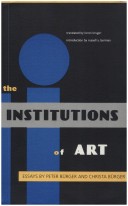Modern German Culture and Literature
1 total work
'An extremely important contribution to contemporary literary theory, in particular to historical and sociological accounts of art and literature' - Russell A. Berman, Stanford University. Art has been an umbrella term for poetry; music, dance, sculpture painting, and architecture since the end of the eighteenth century, when the bourgeoisie were establishing their hegemony over culture and politics in Germany, labor was becoming more clearly divided, and religion was losing its unifying force. Art became a broad and separate entity as the expectations and experience of it changed. "The Institutions of Art" concentrates on German and French literature in illustrating the formation of aesthetic autonomy and the divergence between high and popular culture. Peter Burger builds on his earlier "Theory of the Avant-Garde" (1984), pushing further into key theoretical questions about art and society.Christa Burger extends the critique to the history of the novel, focusing on Goethe and Kleist. Looking backward to feudalism and forward to our century, the authors show how the function of art has changed along with the criteria for its production and evaluation.
Peter Burger is a professor of French at the University of Bremen; Christa Burger a professor of German at the University of Frankfurt. Loren Kruger, an assistant professor of English at the University of Chicago, translated these essays, originally published in Germany. In his introduction, Russell A. Berman, a professor of German at Stanford University, notes the book's special interest to students of literary theory and to sociologists and historians of art.
Peter Burger is a professor of French at the University of Bremen; Christa Burger a professor of German at the University of Frankfurt. Loren Kruger, an assistant professor of English at the University of Chicago, translated these essays, originally published in Germany. In his introduction, Russell A. Berman, a professor of German at Stanford University, notes the book's special interest to students of literary theory and to sociologists and historians of art.
